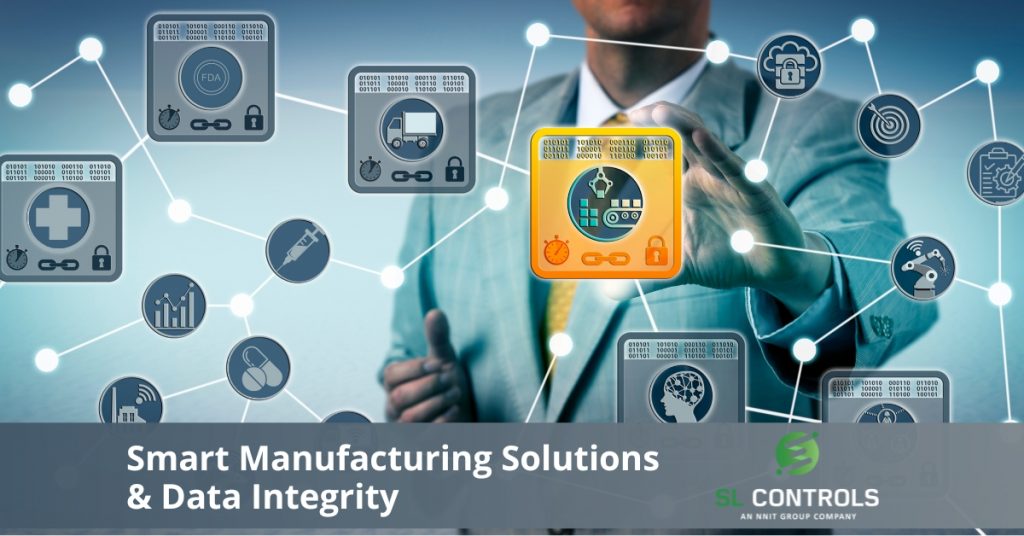Transforming your life sciences facility into a factory of the future involves implementing smart manufacturing solutions as part of a digitalization strategy. Those solutions will ensure you get the benefits of digitalized processes while establishing the foundations for the next stage of your journey. There will be challenges, however, and one of the most important is data integrity.
Without a clear data plan that prioritizes data integrity in every workflow, process, and system, your smart manufacturing solutions will struggle to reach their full potential. They could even fail.
Problems with data integrity and how you use data in your facility can also have wider consequences, whether related to a new smart manufacturing solution or not. We can see this in a study that analyzed warning letters issued to pharmaceutical manufacturers by the FDA. The researchers looked at warning letters issued between 2010 and 2020 and found that 21 percent involved data integrity issues. Only process validation had a greater number of citations.
In other words, data and data integrity are crucial to the systems and processes you use today.
Data and data integrity are also essential for ensuring the successful implementation of the smart manufacturing solutions that will optimize your systems and processes for the future.
What Is Data Integrity?
To understand what data integrity means in the life sciences sector, we can turn to draft guidance published by the FDA in 2016 – Data Integrity and Compliance With CGMP.
“For the purposes of this guidance, data integrity refers to the completeness, consistency, and accuracy of data. Complete, consistent, and accurate data should be attributable, legible, contemporaneously recorded, original or a true copy, and accurate (ALCOA).”
You can read more about ALCOA and ALCOA+ on our blog.
So, data integrity is about having data that is trustworthy and reliable. Only by having reliable and trustworthy data can you get the most out of technologies like digital twins and machine learning. High-quality data is also essential to maximize the potential of your MES and ERP systems, and it is a main focus of GxP.
The Risks of Manual Data Interventions
Manual data intervention is one of the biggest issues with data integrity in pharmaceutical and medical device companies. Manual data interventions can take many forms, including when operators manually collect, store, update, and/or transfer data. If there is a manual intervention in any of these processes, problems can occur:
- Inconsistency becomes a feature of the data
- The data is prone to error and inaccuracies
- The data can be incomplete
- It is easier for the data to become corrupted
- There can be delays in processing the data
The above problems will impact the usefulness of your data, limiting its effectiveness for monitoring, analysis, decision-making, and process optimization.
It isn’t just the manual data that is the problem either, as manual data can corrupt other data it has been integrated with. This means the integrity of your data is dependent on the weakest point.
How to Mitigate the Risk of Manual Data Intervention
There is always a risk when manual data is involved. So, when implementing smart manufacturing solutions, one of the primary aims should be to reduce manual interventions in data capture, storage, and updating.
However, it is not always possible to eliminate all manual data processes. In these situations, steps should be taken to minimize the risks that manual data intervention creates.
For example, providing pre-defined dropdown menus to limit the options when operators are inputting data. Data integrity training for operators is also beneficial.
Achieving Data Integrity When Implementing Smart Manufacturing Solutions
You should work towards achieving a reliable and trustworthy flow of data vertically through the company. This includes from and to functions within the production environment, as well as to parts of the business outside production, including finance, HR, marketing, etc.
It’s also important to have a reliable and trustworthy flow of data horizontally through each stakeholder in the supply chain.
The horizontal flow of data also includes data that must be submitted to regulators, such as the EU’s EUDAMED – European Database for Medical Devices.
Importantly, it’s helpful to remember the flow of data between systems does not happen as standard in most cases. This applies to systems within the production environment as well as systems used by other functions in the business, including MES, LIMS, and ERP systems. Therefore, integration is a central component in almost all smart manufacturing solutions.
Viewing Your Organization’s Data as An Asset
Smart manufacturing is a journey rather than a destination, and the reality is that most companies in the life sciences sector won’t be at an advanced stage for some years to come. That said, automated data processes and good data standards are crucial for your operations today and to prepare your organization for the future.
It is also beneficial to start viewing data as an asset in your organization. When data is viewed as an asset, there is more of an imperative to improve and protect it.

